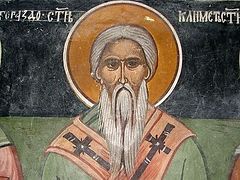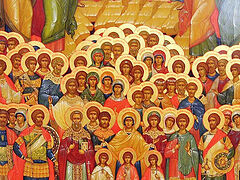In the name of the Father, and of the Son, and of the Holy Spirit.
On the Sunday after the feast of the Holy Trinity the Church prayerfully commemorates all the saints who shone forth in the Church of Christ thanks to their feats of faith and piety. And it should be stressed that the feast of All Saints is naturally linked with the feast of the Holy Trinity (Pentecost).
In a sense, the feast of the Holy Trinity itself is the final event in the story of our salvation, and it became possible thanks to the great work of our Lord Jesus Christ: His incarnation, Passion and Resurrection. The feast of the Holy Trinity has revealed to us great truths for our salvation. First of all, it has revealed to us that God is one in essence yet three in persons: God the Father, God the Son, and God the Holy Spirit—the Consubstantial and Indivisible Trinity.
But the mystery of God the Trinity, which was slightly and subtly revealed in the Old Testament, was revealed in its entirety in the New Testament, in such events as the Baptism and the Transfiguration of the Lord, when the voice of the Heavenly Father was heard: This is my beloved Son, in Whom I am well pleased (Mt. 3:17; 17:5; cf. Mk. 1:11; 9:7; Lk. 3:22; 9:35); and the Holy Spirit appeared in the form of a dove. There were also the words of Christ Himself: I and My Father are one (Jn. 10:30); or, for example: But when the Comforter is come, Whom I will send unto you from the Father, even the Spirit of truth, which proceedeth from the Father, He shall testify of Me (Jn. 15:26).
But in these events the mystery was revealed to the mind rather than to the heart.
Actually, on the feast of the Holy Trinity we celebrate something else—here the work of God the Trinity concerns the very essence of man. When the Holy Spirit descended upon the Apostles in the form of tongues of fire in an Upper Room of Mt. Zion, they were transformed and became new people.
They experienced their new state, a new unity with God and with each other. They felt they were part of the Body of Christ. They began not only to speak different languages, but also acquired the gift of extraordinary strength and fearlessness to bear witness to the Risen Christ all over the globe. The Holy Spirit, “Who art everywhere present and fillest all things”, began to dwell in the Church in a special way in its holy sacraments. He became the creative power that unites the faithful into a Single body of the Church of Christ, the Head of which is our Lord Jesus Christ.
That is why the feast of the Holy Trinity is considered to be the day of the foundation of the Church of the New Testament. After His Ascension to Heaven the Lord did not forsake man, but even more really began to dwell with the faithful in the Holy Spirit. It is especially manifested in the sacrament of Baptism, when a person is born into a new life of grace through union with Christ, and the sacrament of the Eucharist, when real unity with God is attained through communion of the sanctified Body and Blood of Christ the Savior. This is how the words of supplication in the prayer of our Lord Jesus Christ to His Father are fullfilled: That they all may be one; as Thou, Father, art in Me, and I in Thee, that they also may be one in Us: that the world may believe that Thou hast sent Me. And the glory which Thou gavest Me I have given them; that they may be one, even as We are one (Jn. 17:2–22).
Hence the concept of holiness and the divinization of the human personality. Holiness is the measure, the degree of our closeness to God. But it is attained not only by the work and power of the Holy Spirit, but also by our personal feat of self-sacrifice on the path of fulfilling the Commandments of Christ. Thus, holiness is primarily the fruit of the work of the Holy Spirit in the Church of Christ. And it should be noted that there have been a host of such saints in the history of the Church.
These are the ancestors, the prophets, the Apostles, the martyrs, the confessors, the holy hierarchs, the venerable fathers, righteous laypeople, ascetics and, of course, our Most Holy Lady Theotokos and Ever-Virgin Mary.
But the calling to become saints applies to everyone, not just to individuals.
Ye shall therefore be holy, for I am holy (Lev. 11:45; 1 Pet. 1:16), the Lord says. In many of his epistles the holy Apostle Paul himself calls all believers who have already been baptized called to be saints (cf. Rom. 1:7; 1 Cor. 1:2), or the saints and faithful brethren in Christ (Col. 1:2). And the holy Apostle Peter says to all the faithful scattered in various countries: But ye are a chosen generation… an holy nation, a peculiar people; that ye should shew forth the praises of Him Who hath called you out of darkness into His marvellous light (1 Pet. 2:9).
 Archimandrite Luke (Pinaev) This form of addressing the faithful who have received the sacrament of Holy Baptism as “saints” was meant to remind them that they all belonged to the Holy Body of the Church of Christ, were sanctified by the holiness of the Head of this Body of the Lord Jesus Christ and were filled with the Spirit of grace (cf. 1 Cor. 12:13; Heb. 10:29). And therefore, they were obliged to keep themselves in moral purity in every possible way, and avoid everything that is incompatible with the holiness of the Church.
Archimandrite Luke (Pinaev) This form of addressing the faithful who have received the sacrament of Holy Baptism as “saints” was meant to remind them that they all belonged to the Holy Body of the Church of Christ, were sanctified by the holiness of the Head of this Body of the Lord Jesus Christ and were filled with the Spirit of grace (cf. 1 Cor. 12:13; Heb. 10:29). And therefore, they were obliged to keep themselves in moral purity in every possible way, and avoid everything that is incompatible with the holiness of the Church.
For God hath not called us unto uncleanness, but unto holiness (1 Thess. 4:7), the holy Apostle Paul inspires the faithful Thessalonians.
But as He which hath called you is holy, so be ye holy in all manner of conversation (1 Pet. 1:15), the holy Apostle Peter exhorts us.
The first Christians strove with great zeal to walk worthy of the Lord unto all pleasing, being fruitful in every good work (Col. 1:10), so the Apostle Paul had a good reason to say to the Romans: But now being made free from sin, and become servants to God, ye have your fruit unto holiness, and the end everlasting life (Rom. 6:22).
However, subsequently, many Christians began to forget about the loftiness of their calling to a pure and holy life. Sinful self-will began to manifest itself. Unnecessary arguments about supremacy began. A careless attitude towards holiness appeared. Some began to appeal to Christian freedom to justify their tempting behavior. The spirit of zeal for faith and piety gradually weakened, despite the Apostle’s exhortations: Quench not the Spirit... Prove all things; hold fast that which is good. Abstain from all appearance of evil (1 Thess. 5:19, 21–22).
Therefore, the Holy Church keeps reminding us about the holiness of its Head, our Lord Jesus Christ. We all confess this truth at every Divine Liturgy, when in response to the priest’s exclamation, “Holy things are for the holy!” the choir sings on behalf of all of us, “One is Holy, one is Lord, Jesus Christ, to the glory of God the Father!”
Holiness, to which the Lord calls us all, consists of unceasing efforts to become like the Divine First Image and living communion with the All-Holy God, and has its true expression in the personalities and lives of the people who, burning with faith, have labored hard in the fight against sin, and with the help of the grace of God, have succeeded in acts of love and mercy.
Thus, we are all made holy by the holiness of the Church provided that we are not nominal but living and active members of it.
As the Apostle Peter teaches us: To Whom coming, as unto a living stone, disallowed indeed of men, but chosen of God, and precious, Ye also, as lively stones, are built up a spiritual house…, to offer up spiritual sacrifices, acceptable to God by Jesus Christ (1 Pet. 2:4-5).
On this day, dedicated by the Church to the memory of All the Saints who have pleased God through the ages, let us celebrate their ascetic feats and labors, asking for their prayerful intercessions for us before the Lord: “O Forerunner of the Lord, twelve Apostles, all the Saints with the Theotokos, pray that we may be saved!” Amen.




